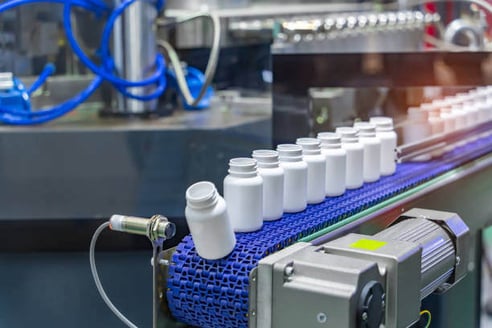Beyond the Wrap: Exposing the Hidden Inefficiencies in Packaging Operations
In packaging and containers manufacturing, efficiency isn't just a buzzword—it's a business imperative. Yet, while many plant managers focus on equipment downtime, labor allocation, and material waste, there's one area that's often underestimated: packaging inefficiency.
The inefficiencies in packaging processes can silently erode profitability, undermine customer satisfaction, and compromise the competitive edge of your facility. For plant managers aiming to lead high-performing operations, identifying and addressing these hidden costs is crucial.
Let's unpack what packaging inefficiency really means, what it costs your plant, and how smart integration tools like PlanetTogether APS combined with enterprise systems such as SAP, Oracle, Microsoft, Kinaxis, or Aveva can help turn the tide.
What Does Packaging Inefficiency Look Like?
Packaging inefficiency refers to a broad set of issues including:
Frequent line stoppages due to supply misalignments
Inaccurate material forecasts leading to overstock or stockouts
Excessive changeover times between product runs
Underutilization of equipment
Mislabeling or defective packaging
Inconsistent production schedules
These issues often stem from siloed systems, lack of real-time visibility, and poor coordination between planning and execution.

The Hidden Costs of Packaging Inefficiency
While some costs are visible (scrap rates, downtime), others fly under the radar and accumulate over time:
1. Lost Revenue Opportunities
Delayed shipments caused by packaging slowdowns can result in lost contracts or penalties. In consumer-driven markets, failing to meet delivery timelines can damage brand reputation and customer trust.
2. Excess Inventory Holding Costs
When material planning is misaligned with packaging schedules, inventory builds up unnecessarily. This ties up working capital and increases warehousing and handling costs.
3. Quality and Compliance Risks
Errors in packaging can lead to mislabeling or compromised product integrity, resulting in product recalls, regulatory fines, or damaged customer relationships.
4. Labor Inefficiencies
Manual rescheduling and excessive changeovers can burn labor hours with little value output. Workers may spend time troubleshooting avoidable problems instead of focusing on productive tasks.
5. Energy Waste and Sustainability Impacts
Frequent equipment starts and stops, or producing more than necessary, waste energy and raw materials, hampering your sustainability goals.
6. Planning Blind Spots
Without accurate forecasting and real-time data, planners rely on outdated or incomplete information, creating a domino effect of inefficiencies across production, inventory, and shipping.
Why Packaging Inefficiency Happens
Packaging inefficiency often arises when operations lack synchronization between production planning and real-world execution. The disconnect can occur due to:
Legacy systems that don’t communicate with each other
Manually managed schedules that don’t reflect real-time conditions
Inability to simulate scenarios or adjust quickly to demand shifts
As a result, teams operate reactively instead of proactively. Even well-intentioned adjustments made on the floor can backfire without full visibility into upstream and downstream effects.

Turning the Tide with Advanced Planning and Scheduling (APS)
This is where Advanced Planning and Scheduling software like PlanetTogether APS makes a real difference. By integrating PlanetTogether with your enterprise platforms like SAP, Oracle, Microsoft Dynamics, Kinaxis, or Aveva, plant managers gain a centralized, real-time view of operations that enables smarter decisions.
Here’s how this integration helps combat packaging inefficiency:
1. Synchronize Materials and Production
APS pulls data from ERP and MES systems to ensure packaging material availability aligns with production runs. No more waiting on missing materials or last-minute surprises.
2. Optimize Scheduling
PlanetTogether allows for drag-and-drop rescheduling, scenario simulation, and constraint-based planning—dramatically reducing changeover times and keeping lines running efficiently.
3. Improve Forecast Accuracy
Integrated forecasting and planning tools provide accurate demand signals that inform packaging requirements well in advance.
4. Enhance Visibility and Communication
Everyone from planners to floor supervisors operates from a single source of truth, reducing miscommunication and eliminating guesswork.
5. Measure and Improve KPIs
Track key metrics like OEE (Overall Equipment Effectiveness), on-time delivery, and waste levels to drive continuous improvement and support strategic goals.
Real-World Impact: A Case in Point
Consider a mid-sized packaging facility that produces customized containers for the food and beverage industry. Before implementing PlanetTogether APS, the plant struggled with frequent scheduling changes, resulting in overtime costs and missed shipments.
After integrating PlanetTogether with Microsoft Dynamics, the facility achieved:
15% reduction in changeover times
20% decrease in inventory holding costs
30% improvement in on-time shipments
Significant reduction in manual scheduling errors
These results weren’t from working harder—they came from working smarter.
Moving Forward: What You Can Do Today
As a plant manager, you can take immediate steps to address packaging inefficiency:
Audit your current packaging workflows to identify waste and bottlenecks
Engage your IT and operations teams to explore integration opportunities
Consider APS software like PlanetTogether that can bridge the gap between planning and execution
Partner with your ERP provider (SAP, Oracle, Microsoft, Kinaxis, Aveva) to ensure seamless data flow
Focus on training and change management to get buy-in across departments
Packaging inefficiency isn't just a nuisance—it's a strategic liability. The hidden costs it imposes can quietly eat into your margins and put your plant at a competitive disadvantage. Fortunately, with the right technology stack and a commitment to synchronization, these inefficiencies can be transformed into opportunities for growth.
By integrating PlanetTogether APS with robust ERP systems like SAP, Oracle, Microsoft Dynamics, Kinaxis, or Aveva, you position your facility not just to survive but to thrive in today’s demanding packaging landscape.
Efficiency starts at the source—and as a plant manager, you have the power to lead the charge. Are you ready to take your manufacturing operations to the next level? Contact us today to learn more about how PlanetTogether can help you achieve your goals and drive success in your industry.
Topics: PlanetTogether Software, Integrating PlanetTogether, Packaging Manufacturing, Improve Forecast Accuracy, Synchronize Materials and Production, Measure and Improve KPIs





















LEAVE A COMMENT